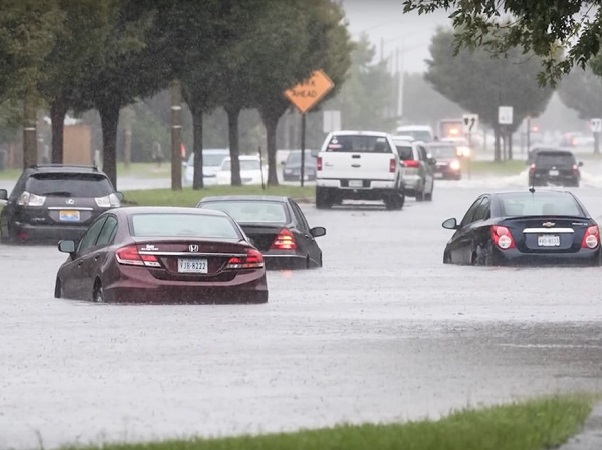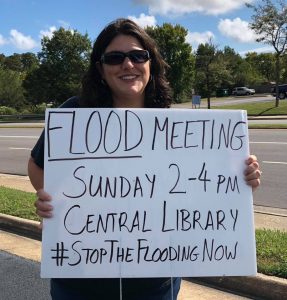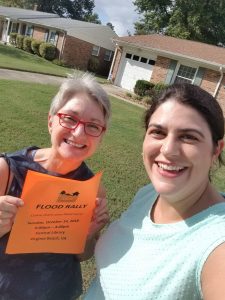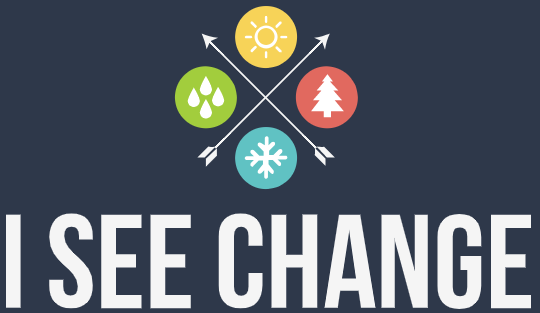Apply now to join our next cohort of Community Science Fellows and Community Leads!

Project Results for Virginia Beach, VA
Results
The focus of the Virginia Beach project was on improving communication between scientists, managers and community members experiencing the impacts of chronic and persistent flooding. The initial objective was for Stop the Flooding NOW and the Princess Anne Civic League to work with a science partner to create a more balanced, cost-efficient and timely solution to the issue of flooding in their neighborhoods.
The team used all available resources from the City of Virginia Beach and Old Dominion University to assess the neighborhood’s susceptibility to flooding and the impact of Sea Level Rise and Climate Change on tidal waters surrounding the neighborhood. Dr. Michelle Covi offered up articles for Virginia to read. Many of these resources helped inspire the work Virginia undertook to educate her community and local elected officials on the risks from flooding.
Both Virginia and Bob attended the Hampton Roads Sea Level Rise Forums that Dr. Covi coordinated. This allowed the team to network and develop relationships with others across the Hampton Roads community. Norfolk, VA has set a model for much of the other cities across the Hampton Roads area and the team was able to learn from their examples.


Project Outputs:
Project Impacts:
Reflections:
From this project, others may learn better ways to partner with Thriving Earth Exchange for their own purposes. For instance,
The team noted that the following contributed to the success of the project:
However, there were a few key things that the team would do differently if they had the chance to do this project again:
To other teams currently pursuing Thriving Earth Exchange projects and for those that anticipate doing a Thriving Earth Exchange project, the team recommends:
When Hurricane Matthew hit the Mid Atlantic in late September of 2016, the city of Virginia Beach experienced wide-spread flooding. Over 10 inches of rain fell in this low-lying section of the city, overburdening its stormwater system. Nearly 2,000 homes in the central part of the city were flooded.
The City of Virginia Beach is part of the larger Hampton Roads metropolitan area with a population over 1.7 million and mainly known for its large, natural harbor and military presence. The area has one of the highest rates of sea level rise on the Eastern seaboard (approximately 4 mm per year on average) exacerbated by continued subsidence (or sinking) of the land. The combination of sea-level rise, subsidence, aging stormwater infrastructure, and increased urban development mean that rainwater is unable to drain properly. The Thalia Creek watershed, situated in the center of the city, sits within the larger Lynnhaven Watershed which drains to the Chesapeake Bay. The Thalia Creek watershed is heavily developed with sparse open space to absorb rainwater during large storm events.
Residents have established two grass root groups to tackle flooding in and around the Thalia Creek watershed: Stop Flooding NOW and the Princess Anne Plaza Civic League Flooding Committee. Stop the Flooding NOW was established as a Facebook group in 2017 as a resource for all Virginia Beach residents to share their experiences and seek solutions to flooding challenges together. Over 1,000 people follow the group posts. The Facebook group is not associated with City government but coordinates with the Princess Anne Plaza Civic League Flooding Committee. The mission of the Committee is to work with city officials and its departments to find and implement solutions to mitigate the flooding. Both groups have access to numerous engineering reports and the results of numerous workshops and forums. Both would like to work closely with a dedicated hydrologist to synthesize the available reports, and develop next steps or proposed solutions. Both groups would use their enhanced understanding to have productive interaction with local decision-makers.
This project was conceived and designed in partnership with the Virginia Beach community leaders and Flood Forum USA.
Stop the Flooding NOW was founded by Virginia Beach residents who wanted to take action to address the chronic flooding in their community.
Grassroots Group Commended for Work on Flooding by Virginia House
Community Leads

Virginia Wasserberg is a member of the Princess Anne Plaza Civic League Flood Committee and the Leader of Stop the Flooding NOW in Virginia Beach, VA.
Virginia is a music major and homeschooling mother of two. In October of 2016 she and her husband, experienced a combined 18 inches of stormwater and sewage back-up due to heavy rains from two tropical storms and Hurricane Matthew. Virginia’s entire neighborhood was flooded and many homes were severely damaged. It took 3 months of restoration before Virginia and her family could move back into their Virginia Beach home. Shortly after these events, Virginia became involved with her local Civic League, seeking solutions to the persistent flooding. After meeting with Virginia Beach City staff, Virginia was motivated to create a Facebook community page, Stop the Flooding NOW in an effort to connect residents with flooding on a more personal level. The page gained momentum in the following months and has become an important communication resource for many residents of Virginia Beach.
Scientific Lead

Michelle Covi is an Assistant Professor of Practice at Old Dominion University in the Department of Ocean Earth and Atmospheric Sciences and part of the Virginia Sea Grant extension program. She conducts research and outreach activities for climate change adaptation and coastal resilience efforts for coastal Virginia with an emphasis on Hampton Roads. Her research areas include sea level rise and resilience risk perception and communication, public participation in adaptation planning processes and engagement/outreach practices. She co-organizes the Hampton Roads Sea Level Rise/ Flooding Adaptation Forum, a quarterly meeting of adaptation stakeholders and co-chaired the Citizen Engagement Working Group of the Hampton Roads Intergovernmental Pilot Project. She completed her doctorate in Coastal Resources Management at East Carolina University, where her focus was on sea level rise risk communication and policy research. She has a Masters degree in Zoology (Marine Science) from University of Georgia and a BS in Biology/Geology from University of Rochester.
This project is part of one of Thriving Earth Exchange’s cohorts. Thriving Earth Exchange has partnered with Flood Forum USA which supports grassroots flood groups across the country by helping them develop strategies for a sustainable future. Thriving Earth Exchange is working with 15 of their grassroots groups to connect them with scientists who can help them better characterize neighborhood-level flood risks and work effectively with local decision makers to mitigate those risks.
ISeeChange is dedicated to empowering communities to document and understand their environment, weather and climate in order to increase resilience. ISeeChange mobilizes communities to share stories and micro-data about climate impacts to inform and improve climate adaptation and infrastructure design. Their platform, tools, and investigations provide equitable, iterative ways for residents to personalize, measure, and track climate change impacts and better participate in community adaptation decisions.
Each post is synced with weather and climate data and broadcast to the community to investigate bigger picture climate trends. Over time, community members can track how climate is changing, season to season, year to year, and understand the impacts on daily life.
ISeeChange is a strategic partner of Thriving Earth Exchange as community members use their platform and tools to better characterize, visualize, and communicate neighborhood-level climate trends and co-develop solutions to mitigate those risks.

(c) 2025 Thriving Earth Exchange